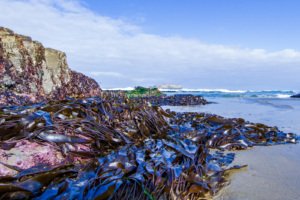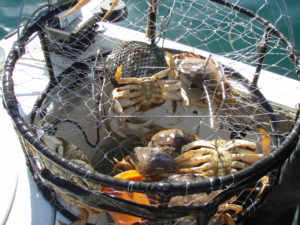
Ian Giancarlo
Former Protect Our Oceans Campaign, Advocate, Environment America
Oregonians have a chance to protect our ocean in 2024.
Former Protect Our Oceans Campaign, Advocate, Environment America
The Pacific coast runs north and south for hundreds of miles and creates our western border. It makes the perfect home for millions of nesting seabirds, like puffins and oystercatchers, as well as for thousands of marine mammals, like seals. Offshore, our waters offer an underwater paradise. Imagine towering kelp forests teeming with life, a seafloor abundant with Dungeness crab and sea stars, and the sight of migrating whales bouncing between shallow and deep water. This scene is what Oregon’s ocean offers, and it’s clear it should be protected. Environment Oregon will be working hard in 2024 to ensure that happens.

Otter Rock Marine ReservePhoto by Oregon Marine Reserves | CC-BY-2.0
Just over 10 years ago, Oregon legislators first invested in their oceans with the state’s Marine Reserve Program. Today, the five marine reserves exist at Otter Rock, Redfish Rocks, Cascade Head, Cape Perpetua, and Cape Falcon contain a vast array of ocean ecosystems and wildlife. Seals, Dungeness crab, sea stars, and countless seabirds all happily call these places home.
The reserves were created originally to engage and educate the public about the wonders beneath their waves, as well as to provide a space for amazing scientific research and monitoring on ever-changing ocean conditions. Researchers at Oregon State University recently prepared a decadal review of the Program, which found that it served its intended purpose, but it could be better with a little more funding.
Last year, Environment Oregon supported HB2903, which would have increased funding for the Program, as well as provide more opportunities to engage and educate the public around ocean conservation. Unfortunately, the bill didn’t pass, but not all is lost. A similar bill will be up and coming in this year’s short legislative session that will restore funding and create a space for more tribal and community engagement with our amazing reserves.
The new bill has our support along with a robust and expansive coalition. Working together, we can get this bill across the finish line and make our successful Marine Reserve Program even better.

Around 30 miles off Oregon’s central coast is an underwater paradise, called Heceta Bank. It’s a rocky reef that rises above the surrounding sea floor and is a safe haven for amazing wildlife such as gray whales, Dungeness crab, octopus, and rockfish. Marine scientists and fishermen know the place well because it’s one of the most productive ecosystems along the United States’ western coast. So much so, that in 2006, it was designated as an essential fish habitat, and closed to bottom trawling.
Over the years, ocean ecosystems like the ones at Heceta Bank, have faced a multitude of threats from overfishing, pollution, oxygen deprivation, varied ocean currents, and vastly ranging ocean temperatures in part caused by climate change. In other words, ocean habitats are stressed, and we know one of the best ways to create more resiliency and bolster our oceans is to permanently protect them.
That’s why Environment Oregon is working to permanently protect Heceta Bank, which will limit the level of activity we have there, and provide more space for the environment to exist in it’s fullest, most natural form. The Biden administration has set a bold and ambitious goal to conserve 30% of our lands and waters by 2030, and protecting Heceta Bank would be an important step forward in realizing that vision.
When you give, you can help protect the places that all of us love and promote core environmental values, such as clean air to breathe, clean water to drink, and clean energy to power our lives.
Donate
Former Protect Our Oceans Campaign, Advocate, Environment America
I
